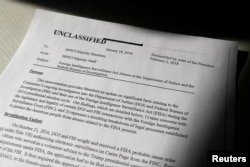A controversial document prepared by Republican members of Congress accuses U.S. law enforcement officials of abusing their surveillance authorities during the Russia investigation.
The 3½-page secret memo, written by Republicans on the House Intelligence Committee, was released Friday after President Donald Trump authorized its declassification.
What the memo alleges
The memo’s key allegation is that the U.S. Justice Department and the FBI improperly obtained a series of electronic surveillance warrants on former Trump associate Carter Page as part of the probe into Russian interference in the 2016 U.S. election.
Page served as a foreign policy adviser for the Trump campaign and came under U.S. intelligence suspicion after traveling to Moscow and meeting with Russian officials.
FBI surveillance of foreign spies and other foreign targets in the United States is overseen by a secret court known as the Foreign Intelligence Surveillance Court (FISC). To obtain a warrant from the court, the FBI must furnish evidence that the target is a foreign power or an agent of a foreign government.
In Carter’s case, the memo alleges, the FBI substantially relied on information from a research dossier compiled by a former British intelligence officer for the election campaign of Trump’s rival, Hillary Clinton. The bureau used the information in its initial warrant application in October 2016 after Page had left the campaign as well as three subsequent renewal applications.
The author of the dossier, Christopher Steele, was a longtime FBI source who was paid by the Clinton campaign and the Democratic National Committee, via the law firm Perkins Cole and the research firm Fusion GPS, to "obtain derogatory information on Donald Trump's ties to Russia," according to the memo.
Steele is also accused of harboring an anti-Trump bias during the campaign, telling a senior Justice Department official two months before the 2016 election that he “was desperate that Donald Trump not get elected and was passionate about him not being president.” Trump has called the dossier’s allegations about his personal and financial ties to Russia a “Crooked Hillary Pile of Garbage.”
But while the dossier formed an “essential part” of the Page surveillance applications, the memo says, FBI and DOJ officials failed to disclose that the underlying information had been funded by the Democrats “even though the political origins of the Steele dossier were then known to senior DOJ and FBI officials.”
The government “had at least four independent opportunities before the FISC to accurately provide an accounting of the relevant facts,” the Republicans wrote in the memo. “However, our findings indicate that ... material and relevant information was omitted.”
To support their claim that the dossier was central to obtaining the warrants, the Republicans cited December 2017 testimony by former FBI Deputy Director Andrew McCabe that “without the dossier information,” no surveillance warrant would have been sought.
Democrats on the House Intelligence Committee who unsuccessfully tried to block the memo’s release blasted the document for “serious mischaracterizations.”
In a statement, Adam Schiff, the ranking Democrat on the intelligence panel, said the FBI “would have been derelict in its responsibility to protect the country had it not sought a FISA [Foreign Intelligence Surveillance Act] warrant.”
What the memo doesn't say
While the memo says the application relied on unsubstantiated information from the Steele dossier, it doesn’t say what other pieces of evidence the FBI invoked to obtain the warrants. A FISA warrant application typically contains multiple sources of classified information to establish probable cause that the target of a proposed surveillance works for a foreign government.
Former Attorney General Alberto Gonzales said a key question that is left unanswered in the memo is whether other information used in the application was enough to warrant its approval.
“There is a lot of questions raised by the information that I’d like to get answers to,” Gonzales told VOA.
Ahead of the memo’s public release, Trump tweeted that the “top Leadership and Investigators of the FBI and the Justice Department have politicized the sacred investigative process in favor of Democrats and against Republicans — something which would have been unthinkable just a short time ago. Rank & File are great people!"
But the memo does not directly accuse the top brass at the FBI and Justice Department of any wrongdoing, though it does say that senior officials, including former FBI Director James Comey, former Deputy Attorney General Sally Yates, and current Deputy Attorney General Rod Rosenstein, all signed off on the Page warrant applications.
Gonzales said that top officials who sign FISA warrant applications don’t always get to read every fact included in them.
“You're not necessarily going to know what’s not included in the application and nonetheless you go ahead and sign the FISA application,” he said.
Gonzales said criticism of the department’s top brass can trickle down to its rank and file.
“Whatever one might say about being for the rank and file at the department, the line prosecutors and line investigators, anytime you attack the leadership or the work of the department, it does hurt the morale of the rank and file,” he said.
“I’m worried that the public’s confidence in the integrity of investigations and prosecutions by the Department of Justice has been eroded,” Gonzales said. “I think that’s a terrible place to be, quite frankly.”








